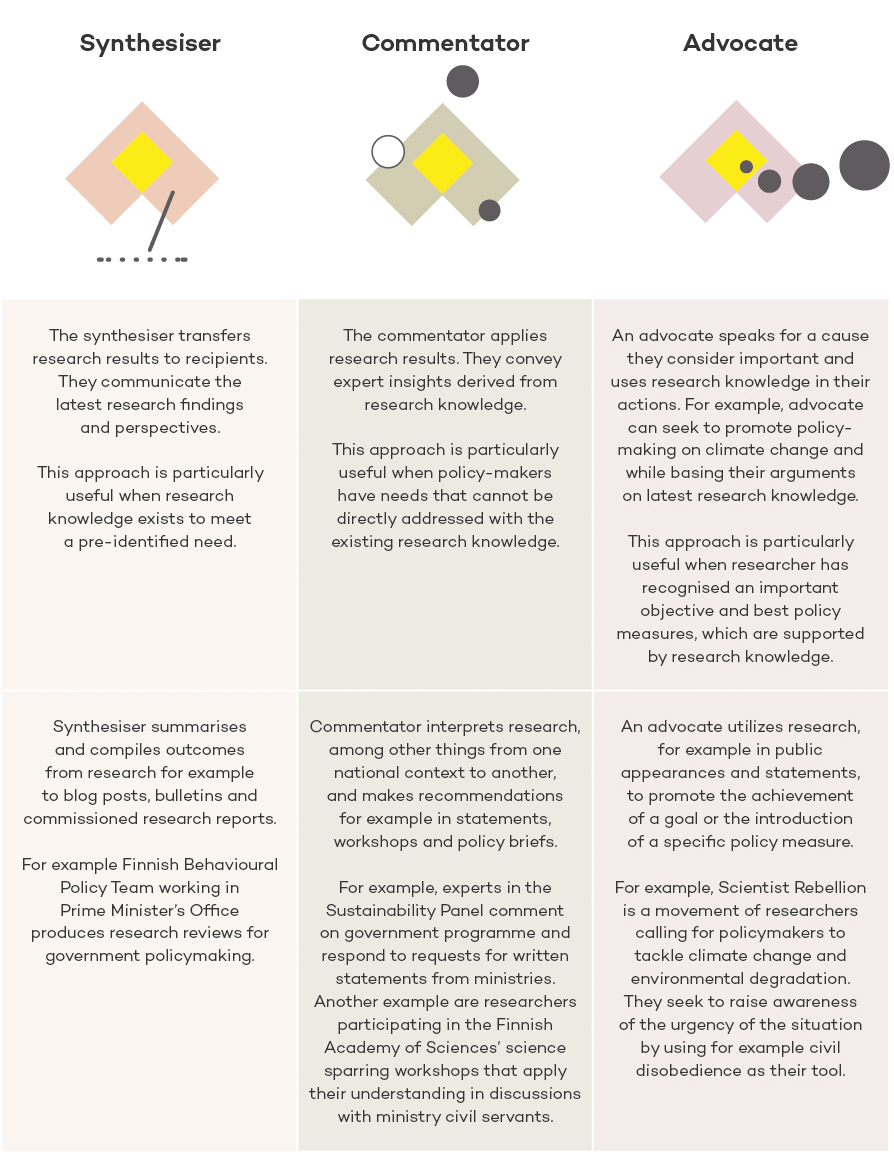Part 2. Researchers’ roles in supporting policy-making
Reports produced for various ministries and opinion pieces in newspapers and magazines are typical ways of promoting the transmission of research knowledge to policy-makers. Often these texts focus on describing the latest research results, or results that complement public discourse at the time. However, focusing on research results and reporting on them is only one way of promoting the societal impact of research.
Researchers can also take a step or two toward a more context-specific and applied method of expressing and channelling research knowledge. This can occur, because a) the needs of policy-makers require that the results are applied to suit the context of policy-making, and b) the researchers themselves think that interpreting the results in their context and forming additional conclusions is beneficial to the impact of the knowledge.
The way researchers operate in support of policy-making can be analysed from the perspectives of different roles. These perspectives highlight the kinds of opportunities researchers have to channel research knowledge. In each role the researcher’s relationship with research knowledge is slightly different, as is the format in which the knowledge is channelled. In practice, researchers operate in several different roles. For example, a researcher can first present research knowledge in the final seminar of a research project and then recommend certain measures or even speak on behalf of a specific solution.
Researchers can support policy-making in three different roles

Each of the roles described above have their own strengths when interacting with policy-makers. Each role also involves aspects you should consider when you decide to play a certain role or when you are asked to comply with a certain role.
The strength of the Synthesiser is adherence to research results. This adds to the reliability and precision of the messages. The Synthesiser must consider that in many situations researchers are expected to comment on issues for which the research results do not offer clear answers. You should be aware of the possibility of such additional questions. They are commonplace in committee hearings, requests for written statements and in working with policy-makers in general. As a Synthesiser you can choose whether to leave the question unanswered or whether you switch roles.
The Commenter’s strength is the interpretation of research results and the expert insights derived from them. This enables the transmission of reliable assessments based on research knowledge and helps to respond to the needs of policy-makers in a flexible manner. The Commenter must consider that significant power of interpretation is used in the application of research knowledge. In interpretation, research results are adapted for the purposes of utilising the knowledge, which has the effect that the research results are now only used to provide background or support for the channelled knowledge. Furthermore, when giving recommendations you must choose the level of precision, i.e., how concrete and practical the suggested measures are.
The strength of the Advocate is the utilisation of research knowledge in striving towards a specified goal. This is made possible by well-justified arguments that can be used to promote societal change. The Advocate must consider that in this kind of activity the research knowledge and other perspectives become intertwined. When playing the role of the Advocate, you should express your own vision and demonstrate how research supports it. This makes the difference between research knowledge and personal views more apparent.

Tip: Having an understanding of the three roles of a researcher is useful when:
- You strive to understand the means by which research knowledge can be channelled to policy-making.
- You wish to conceptualise your own role or the role of someone else in the interaction between research and policy-making.
- You reflect upon which role suits you best.
- You hope policy-makers would define more specifically the kind of input they hope from you.
Researchers and policymakers learn from one another
When researchers and policy-makers interact, learning occurs. Policy-makers learn about researchers and how research is conducted, including how research knowledge is produced, what it is like to discuss and work with researchers and how research can support policy-making.
At the same time, the researchers’ understanding of policy-making and policy-makers increases. For their part, researchers learn about matters such as the various stages and needs of policy-making, how messages to policy-makers are worded and drafted and how hearing events proceed. It is also typical that researchers come up with new research topics as a result of their participation in interaction!
Learning is crucial for the promotion of the societal impact of research. Policy-makers’ increased understanding of research can be considered to increase the impact of research in and of itself. Furthermore, learning can be a requisite or enabler of the societal impact of research on the long term. The improved understanding of research among policy-makers facilitates the interpretation and utilisation of research knowledge, and new interaction skills can support more pleasant and informative discussion with researchers.
Simply by participating in the interaction between research and policy, in one role or another, the researcher is enabling the societal impact of research!
